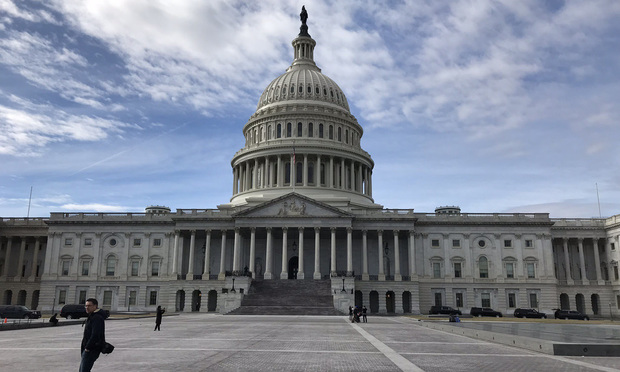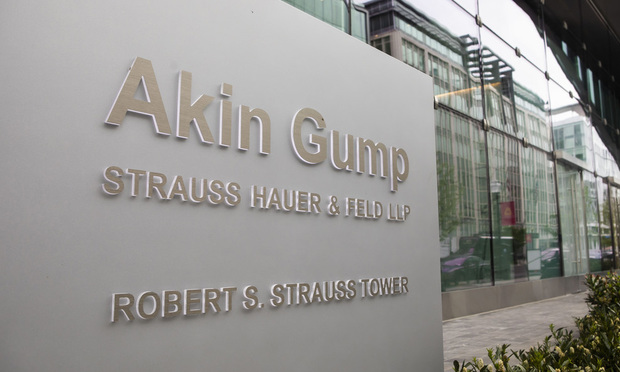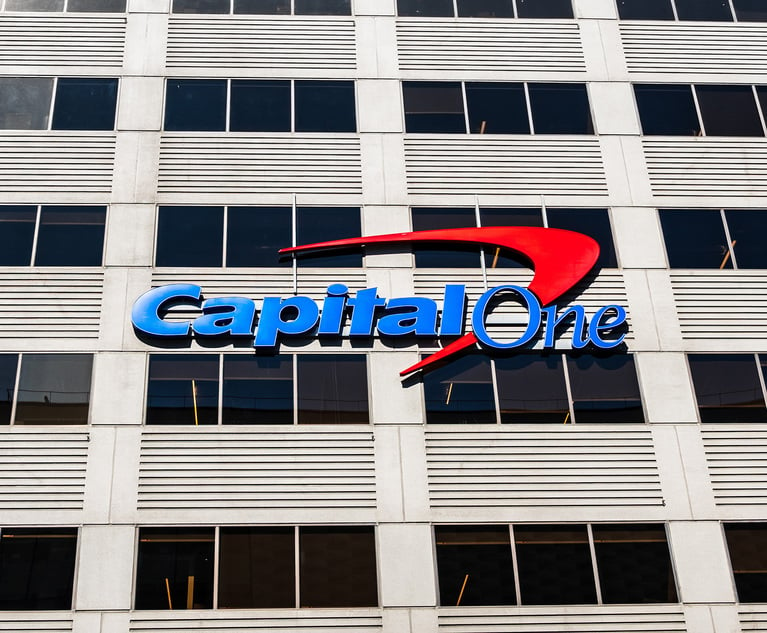'Unprecedented Need for Information': Inside the Lobbying Frenzy Over the $2 Trillion Coronavirus Package
"It has been an all-hands-on-deck moment for the law firm in a way that I think has never really existed before in the policy space," Akin Gump partner Hunter Bates said.
April 01, 2020 at 05:31 PM
8 minute read
The original version of this story was published on National Law Journal
 The U.S. Capitol Building. Credit: Mike Scarcella/ALM
The U.S. Capitol Building. Credit: Mike Scarcella/ALM
Last week, once Congress had finalized a roughly $2 trillion relief package responding to the coronavirus crisis, the lobbying firm Monument Advocacy held a virtual happy hour to take a break from the flurry of emails and working the phones.
Reunited on Zoom, the staff played a game, matching their teleworking colleagues to baby photos they had all provided in advance. In a round of trivia, they were asked which of their colleagues grew up in a house that had been occupied by Confederate and Union soldiers during the Civil War. The answer: Stewart Verdery, the boutique firm's CEO, who was raised in the Richmond area.
For Monument Advocacy, it was a moment to decompress, to step away from the frenzy that had surrounded an emergency spending bill that mobilized Washington's lobbying corps just as the coronavirus outbreak upended everyday working life. Laboring from home, lobbyists across Washington spent hours on calls and videoconferences, sharing information with colleagues in extended email chains, all while satisfying the appetites of clients hungry for details on the development of the largest emergency spending bill in the nation's history.
"When you have such a high-profile, all-hands-on-deck crisis, to not be able to work with them directly was really strange," Verdery said in a recent interview with The National Law Journal.
"You had an unprecedented need for information. This was the biggest bill ever put together, and it was done at a thousandth the speed of normal legislation, affecting pretty much every company, every industry—pretty much anybody who would care about anything," he added.
As the Treasury Department now takes the reins of a pandemic response that will feature billions in loans and other relief, lobbyists are setting their gaze more squarely on the Trump administration and helping clients weigh whether to tap into federal spending that comes with significant strings attached.
The lobbying rush came as many firms were still adapting to a new normal ushered in by the coronavirus outbreak, a global pandemic that is projected to claim more than 100,000 lives in the United States. In an industry that places a premium on face time and access, the coronavirus crisis relegated lobbyists to strictly phone and email communication with congressional and administration officials, forcing them to find new and, at times, creative ways to influence the relief bill. The in-person meeting, even with one's own colleagues, is off the table.
"It has become the new standard operating procedure—that's a lot of phone calls, a lot of emails," said Scott Mason, a senior policy advisor at Holland & Knight, who registered last month to lobby for the battery manufacturer Energizer in connection with the coronavirus relief package.
In some ways, Mason said, "responsiveness seems to have gone up, because everybody's sitting in front of their computers and cell phones all day long. It's probably increased communications to some degree."
With congressional and administration staff pinched for time, lobbyists said the coronavirus era has rewarded those who built relationships with government officials—and obtained their cellphone numbers.
"What came in very handy in the run-up to stimulus were cellphone numbers of key officials, who responded more quickly to text than email," said Cesar Conda, the founding principal of Navigators Global, a lobbying firm that connected Delta Air Lines with administration officials in the crafting of the airline rescue plan. Conda, a former chief of staff to U.S. Sen. Marco Rubio, R-Florida, said his work also involved finding "entry points" into the White House COVID-19 task force to help clients, including GM, UPS and Johnson & Johnson, assist in the response to the outbreak.
At Akin Gump Strauss Hauer & Feld, among the largest U.S. lobbying shops by revenue, leaders of the firm's public policy group began holding a daily 5 p.m. call to provide updates on the stimulus bill. Over time, the call doubled to include about 100 lawyers and lobbyists, with many tuning in for tidbits about how the legislation might affect industries and individual clients.
"We have never been busier in the policy group than we've been over the last two weeks. And while everyone is working from their laptop and their iPhone, the day starts when the sun comes up, and you don't stop with phone calls and emails until you go to bed at night," said Akin Gump partner Hunter Bates, a co-leader of the firm's public law and policy practice.
 Akin Gump Strauss Hauer & Feld's office at 2001 K Street, NW, in Washington, D.C. Photo by Diego Radzinschi
Akin Gump Strauss Hauer & Feld's office at 2001 K Street, NW, in Washington, D.C. Photo by Diego Radzinschi"It has been an all-hands-on-deck moment for the law firm in a way that I think has never really existed before in the policy space," Bates added. "This really cuts across every sector of our economy, and as a result, it's involving virtually all of our practice groups."
'Everybody in Washington chasing rumors'
Airlines, among the companies hardest-hit by the coronavirus crisis, emerged as big winners from the stimulus package. The bill, signed into law Friday, authorized billions of dollars in loans and other financial assistance to airlines and cargo carriers. The aerospace giant Boeing, which has ramped up its lobbying amid scrutiny of deadly plane crashes, is expected to benefit from a $17 billion federal loan program for businesses considered "critical to maintaining national security."
The scope of the relief package, combined with the rush to pass it, created fertile ground for lobbyists hoping to score long-pursued policy victories. Community banks, for instance, seized on the crisis to re-up a push to lower requirements for capital reserves. The legislation lowered the reserve requirements, although the change is, for now, only in effect as long as the coronavirus crisis continues.
In interviews, lobbyists said their work was aimed as much on educating clients about the stimulus package as it was influencing the final legislation. Many firms sent email blasts, in some cases multiple times a day, updating clients how the stimulus package was progressing.
"You've got everybody in Washington chasing rumors and draft summaries and draft legislation in a way I've never seen before. Trying to tell between what's rumor and what's real has been a full-time job for people in our space," Bates said.
Verdery, whose client roster includes Amazon and Starbucks, said Monument Advocacy created a "SWAT team" of lobbyists who kept each other informed on an "enormous email" chain of any piece of intelligence picked up in calls, texts and emails. Details about the bill were fed to client managers, in what he described as "a hub-and-spoke" information flow. In twice-daily email blasts, Monument Advocacy updated clients on the moves of Congress, the Trump administration and foreign countries.
As the number of cases rose, the firm began including updated tallies—both globally and in the U.S.—at the top of the emails.
"To be able to sift through all the rumors quickly and give people accurate information … that was a huge thing for many industries," Verdery said.
 Amazon offices. (Credit: Mike Scarcella / ALM)
Amazon offices. (Credit: Mike Scarcella / ALM)In some instances, lobbying meant going to federal agencies for short-term guidance. Verdery said his firm, on behalf of clients such as Microsoft and Amazon, helped convince the Department of Homeland Security to clarify that companies could remotely confirm workers' employment eligibility rather than rely on physical documents in hiring. The department said companies will have to verify workers' eligibility using physical copies of so-called I-9 forms at a later date.
With the relief package passed, lobbyists are expected to increasingly focus their efforts on the Treasury Department and other federal agencies. Many companies must now consider whether to pursue relief from the Treasury Department, a calculation that requires weighing the "pros and cons of the financial assistance and the strings that are going to be attached to that relief," Verdery said.
In the weeks ahead, Conda expects the lobbying business "will change dramatically," with firms continuing to transition to teleconferencing. Still, the fundamentals will apply.
"You still need to have trusted relationships with lawmakers and staffers, but policy substance and ability to communicate cogently and effectively will be at a premium," he said.
"But the days of backslapping at the Capital Grille are over."
Read more:
New Normal Sets In for White-Collar Lawyers in the Virus Era
'It's Going to Be Extraordinary': Predictions From Neil Barofsky for Coronavirus Oversight
In Washington, Big Law Partners Bring a Spirit of Resilience to the New Normal
What Can Employers Ask and Disclose About COVID-19? EEOC Has Answers.
As Coronavirus Ravages the Economy, Bankruptcy Attorneys Prepare for the Flood
This content has been archived. It is available through our partners, LexisNexis® and Bloomberg Law.
To view this content, please continue to their sites.
Not a Lexis Subscriber?
Subscribe Now
Not a Bloomberg Law Subscriber?
Subscribe Now
NOT FOR REPRINT
© 2025 ALM Global, LLC, All Rights Reserved. Request academic re-use from www.copyright.com. All other uses, submit a request to [email protected]. For more information visit Asset & Logo Licensing.
You Might Like
View All
'Knowledge of Mismatch:' Fed Judge Offers Guidance on How to Hold Banks Accountable for Erroneous Transfers

'Reverse Robin Hood': Capital One Swarmed With Class Actions Alleging Theft of Influencer Commissions in January

SEC Official Hints at More Restraint With Industry Bars, Less With Wells Meetings
4 minute readLaw Firms Mentioned
Trending Stories
- 1Public Notices/Calendars
- 2Wednesday Newspaper
- 3Decision of the Day: Qui Tam Relators Do Not Plausibly Claim Firm Avoided Tax Obligations Through Visa Applications, Circuit Finds
- 4Judicial Ethics Opinion 24-116
- 5Big Law Firms Sheppard Mullin, Morgan Lewis and Baker Botts Add Partners in Houston
Who Got The Work
J. Brugh Lower of Gibbons has entered an appearance for industrial equipment supplier Devco Corporation in a pending trademark infringement lawsuit. The suit, accusing the defendant of selling knock-off Graco products, was filed Dec. 18 in New Jersey District Court by Rivkin Radler on behalf of Graco Inc. and Graco Minnesota. The case, assigned to U.S. District Judge Zahid N. Quraishi, is 3:24-cv-11294, Graco Inc. et al v. Devco Corporation.
Who Got The Work
Rebecca Maller-Stein and Kent A. Yalowitz of Arnold & Porter Kaye Scholer have entered their appearances for Hanaco Venture Capital and its executives, Lior Prosor and David Frankel, in a pending securities lawsuit. The action, filed on Dec. 24 in New York Southern District Court by Zell, Aron & Co. on behalf of Goldeneye Advisors, accuses the defendants of negligently and fraudulently managing the plaintiff's $1 million investment. The case, assigned to U.S. District Judge Vernon S. Broderick, is 1:24-cv-09918, Goldeneye Advisors, LLC v. Hanaco Venture Capital, Ltd. et al.
Who Got The Work
Attorneys from A&O Shearman has stepped in as defense counsel for Toronto-Dominion Bank and other defendants in a pending securities class action. The suit, filed Dec. 11 in New York Southern District Court by Bleichmar Fonti & Auld, accuses the defendants of concealing the bank's 'pervasive' deficiencies in regards to its compliance with the Bank Secrecy Act and the quality of its anti-money laundering controls. The case, assigned to U.S. District Judge Arun Subramanian, is 1:24-cv-09445, Gonzalez v. The Toronto-Dominion Bank et al.
Who Got The Work
Crown Castle International, a Pennsylvania company providing shared communications infrastructure, has turned to Luke D. Wolf of Gordon Rees Scully Mansukhani to fend off a pending breach-of-contract lawsuit. The court action, filed Nov. 25 in Michigan Eastern District Court by Hooper Hathaway PC on behalf of The Town Residences LLC, accuses Crown Castle of failing to transfer approximately $30,000 in utility payments from T-Mobile in breach of a roof-top lease and assignment agreement. The case, assigned to U.S. District Judge Susan K. Declercq, is 2:24-cv-13131, The Town Residences LLC v. T-Mobile US, Inc. et al.
Who Got The Work
Wilfred P. Coronato and Daniel M. Schwartz of McCarter & English have stepped in as defense counsel to Electrolux Home Products Inc. in a pending product liability lawsuit. The court action, filed Nov. 26 in New York Eastern District Court by Poulos Lopiccolo PC and Nagel Rice LLP on behalf of David Stern, alleges that the defendant's refrigerators’ drawers and shelving repeatedly break and fall apart within months after purchase. The case, assigned to U.S. District Judge Joan M. Azrack, is 2:24-cv-08204, Stern v. Electrolux Home Products, Inc.
Featured Firms
Law Offices of Gary Martin Hays & Associates, P.C.
(470) 294-1674
Law Offices of Mark E. Salomone
(857) 444-6468
Smith & Hassler
(713) 739-1250









